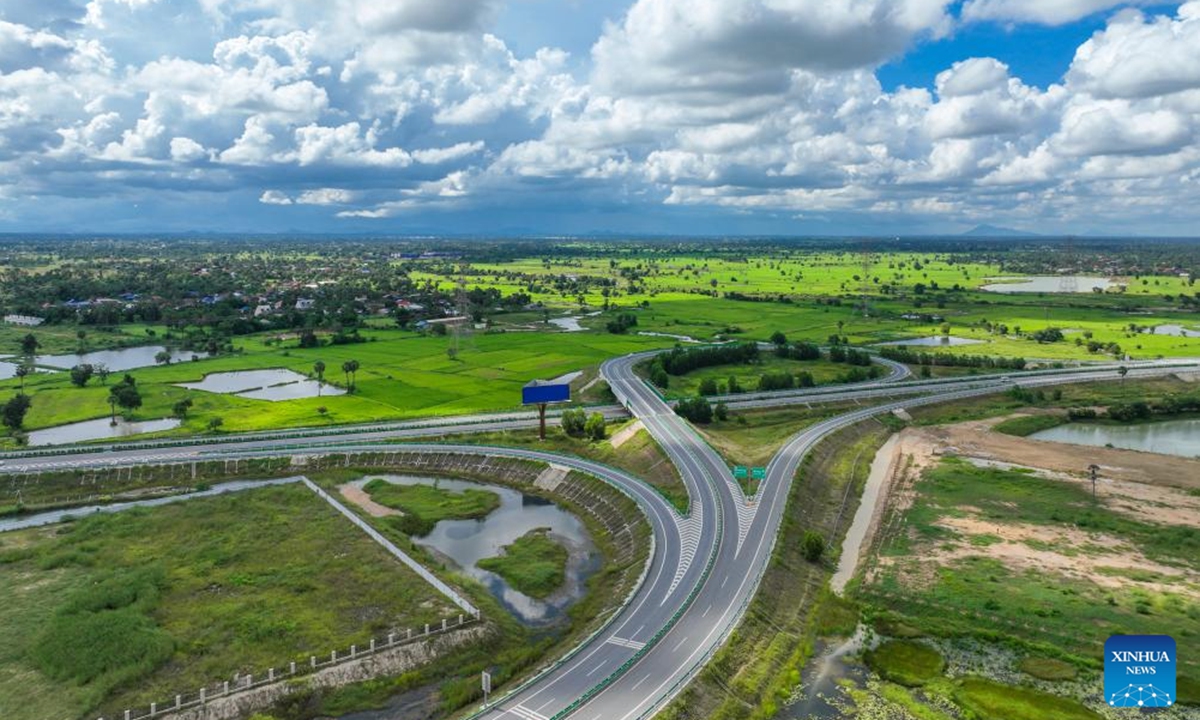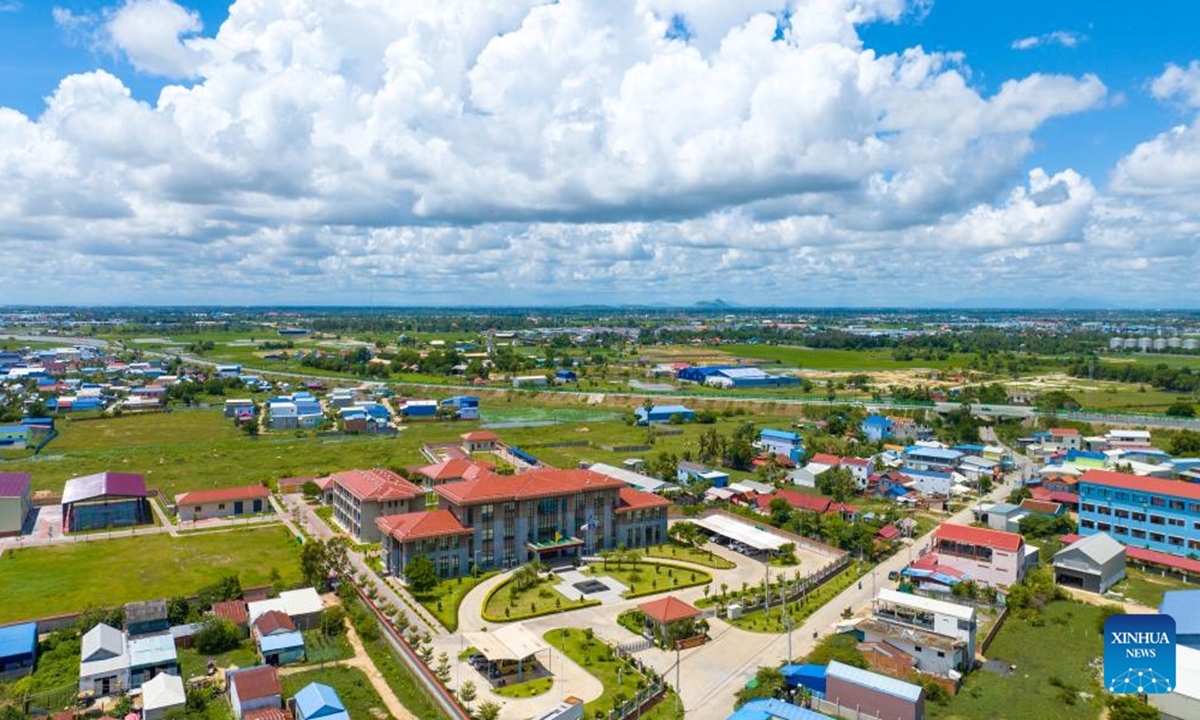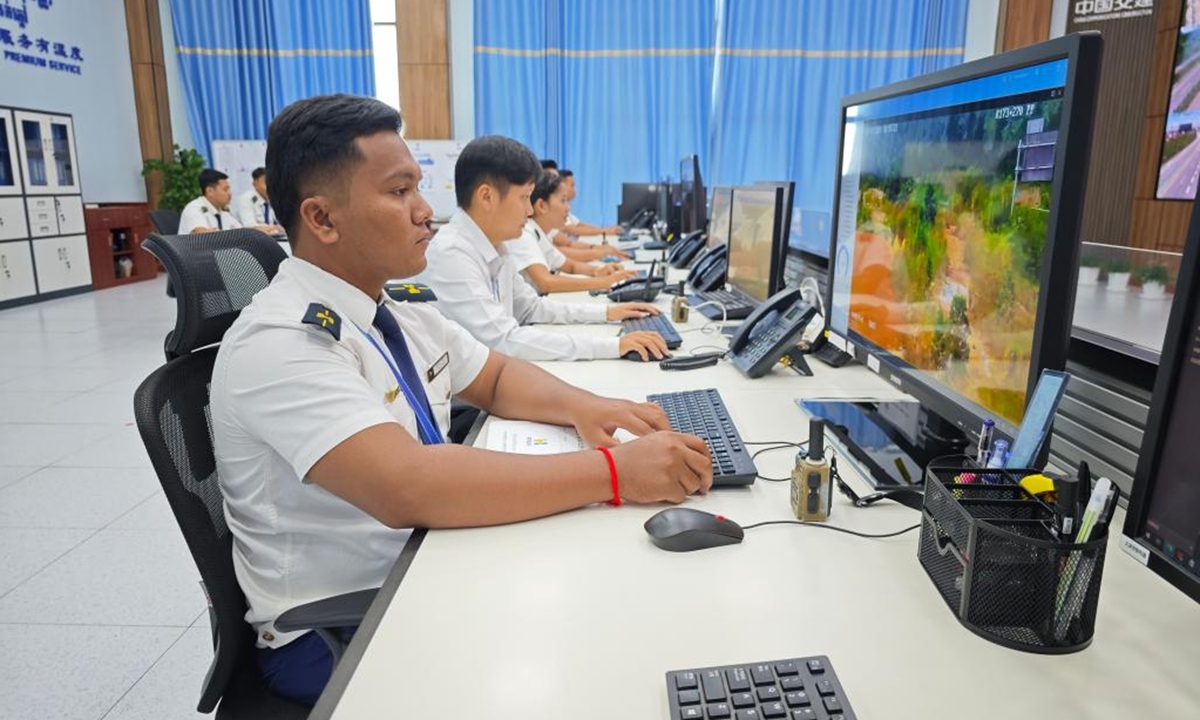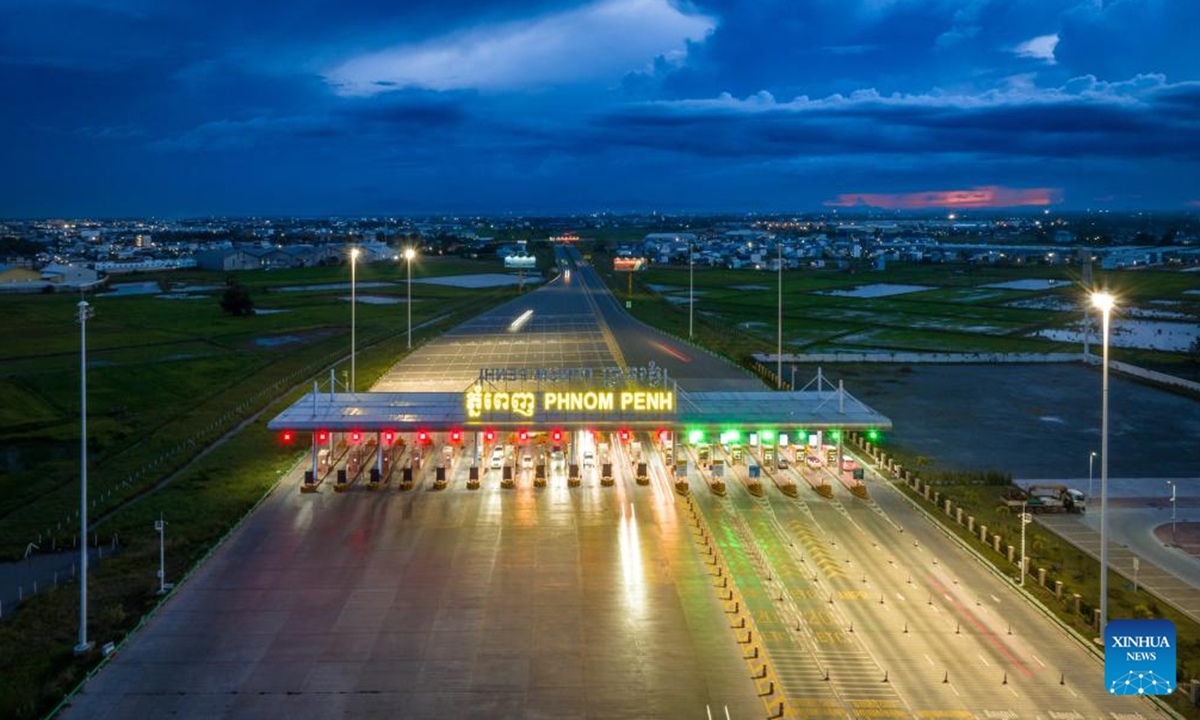
An aerial drone photo taken on Sept. 25, 2024 shows a section of the Phnom Penh-Sihanoukville Expressway in Kampong Speu province, Cambodia. The number of users of the Chinese-invested Phnom Penh-Sihanoukville Expressway in Cambodia had hit 10 million during the first two years of its operation. (Cambodian PPSHV Expressway Co., Ltd./Handout via Xinhua)

An aerial drone photo taken on Sept. 25, 2024 shows the headquarters of the Phnom Penh-Sihanoukville Expressway in Phnom Penh, Cambodia. The number of users of the Chinese-invested Phnom Penh-Sihanoukville Expressway in Cambodia had hit 10 million during the first two years of its operation. (Cambodian PPSHV Expressway Co., Ltd./Handout via Xinhua)

Staff members work in a traffic camera control room of the Phnom Penh-Sihanoukville Expressway in Phnom Penh, Cambodia, on Nov. 1, 2024. The number of users of the Chinese-invested Phnom Penh-Sihanoukville Expressway in Cambodia had hit 10 million during the first two years of its operation. (Cambodian PPSHV Expressway Co., Ltd./Handout via Xinhua)
The number of users of the Chinese-invested Phnom Penh-Sihanoukville Expressway in Cambodia had hit 10 million during the first two years of its operation.
The Cambodian PPSHV Expressway Co., Ltd., which is the operator of the 187-km expressway, marked the motorway's second anniversary on Friday, awarding a gift to the 10 millionth user of the road.
According to the company, Chhum Sophearun, a 42-year-old taxi driver, became the 10 millionth user of the Phnom Penh-Sihanoukville Expressway on Oct. 2 and was given free travel for one year on the expressway.
Speaking at the event, Cambodian Minister of Public Works and Transport Peng Ponea said the expressway, the first of its kind in Cambodia, has become a key strategic route, linking the first economic powerhouse of Phnom Penh with the second economic powerhouse of the coastal province of Sihanoukville.
"This expressway has been providing great benefits to Cambodia's socio-economic development and tourism," he said. "It has played a crucial role in improving the efficiency of travel and goods transport."
Ponea said the motorway was one of the major achievements in Cambodia under Belt and Road cooperation, in addition to the Sihanoukville Special Economic Zone, the Siem Reap Angkor International Airport, and the Morodok Techo National Stadium.
"These achievements are a solid testament to our joint efforts in building a Cambodia-China community with a shared future," he said.
Chinese Ambassador to Cambodia Wang Wenbin said the expressway was a landmark project of China-Cambodia cooperation under the BRI.
"It is a vivid example of China-Cambodia joint efforts in building a high-quality, high-level and high-standard community with a shared future in a new era," he said.
The ambassador said the expressway has significantly contributed to creating job opportunities, promoting regional development and improving the well-being of local people.
Wang added that he had traveled on the expressway many times and was impressed with the road's high quality and sound management.
Speaking to Xinhua at the event, Sophearun said he was excited to be contacted by an expressway staff member to inform that he had become the 10 millionth expressway user.
"Usually, I travel on the expressway from Phnom Penh to Sihanoukville and vice versa, carrying tourists from Europe, China or Indonesia," he said.
Sophearun said traveling on the expressway saves a lot of time, as it takes only two hours to go from Phnom Penh to Sihanoukville, while traveling on the National Road 4 takes up to five hours at the same distance.
"Traveling on the old road (National Road 4) takes a lot of time and costs a lot of money on fuel and car maintenance due to uneven road surface, so in sum, the expense for traveling on the old road is higher than that on the expressway," he said.
"The expressway is the best choice," he said. "I would like to urge all drivers to use this expressway because it is quite safe and very convenient to travel."
Invested by the China Road and Bridge Corporation under the build-operate-transfer (BOT) model in the amount of 2 billion U.S. dollars, the Phnom Penh-Sihanoukville Expressway is the first-ever freeway in Cambodia and is the largest single project under the Belt and Road Initiative.
With two lanes for traffic in each direction plus an emergency lane on each side, vehicles can reach their destinations within two hours through the expressway instead of five hours on National Road 4.
Teng Sokhen, a 25-year-old toll collector at the Phnom Penh-Sihanoukville Expressway, said the expressway has provided a safe, convenient, and efficient travel option for all drivers.
"I'm really happy to work at this expressway because this road has contributed to Cambodia's social development, economic growth and tourism, and has provided a lot of benefits to the people of Cambodia," she told Xinhua.
"As a staff member, I'm glad to be a contributor to the society," she said.
According to Sokhen, more than 10,000 vehicles ply the expressway on average per day.

An aerial drone photo taken on Sept. 25, 2024 shows a toll station of the Phnom Penh-Sihanoukville Expressway in Phnom Penh, Cambodia. The number of users of the Chinese-invested Phnom Penh-Sihanoukville Expressway in Cambodia had hit 10 million during the first two years of its operation. (Cambodian PPSHV Expressway Co., Ltd./Handout via Xinhua)

Staff members work in a traffic camera control room of the Phnom Penh-Sihanoukville Expressway in Phnom Penh, Cambodia, on Nov. 1, 2024. The number of users of the Chinese-invested Phnom Penh-Sihanoukville Expressway in Cambodia had hit 10 million during the first two years of its operation. (Cambodian PPSHV Expressway Co., Ltd./Handout via Xinhua)
